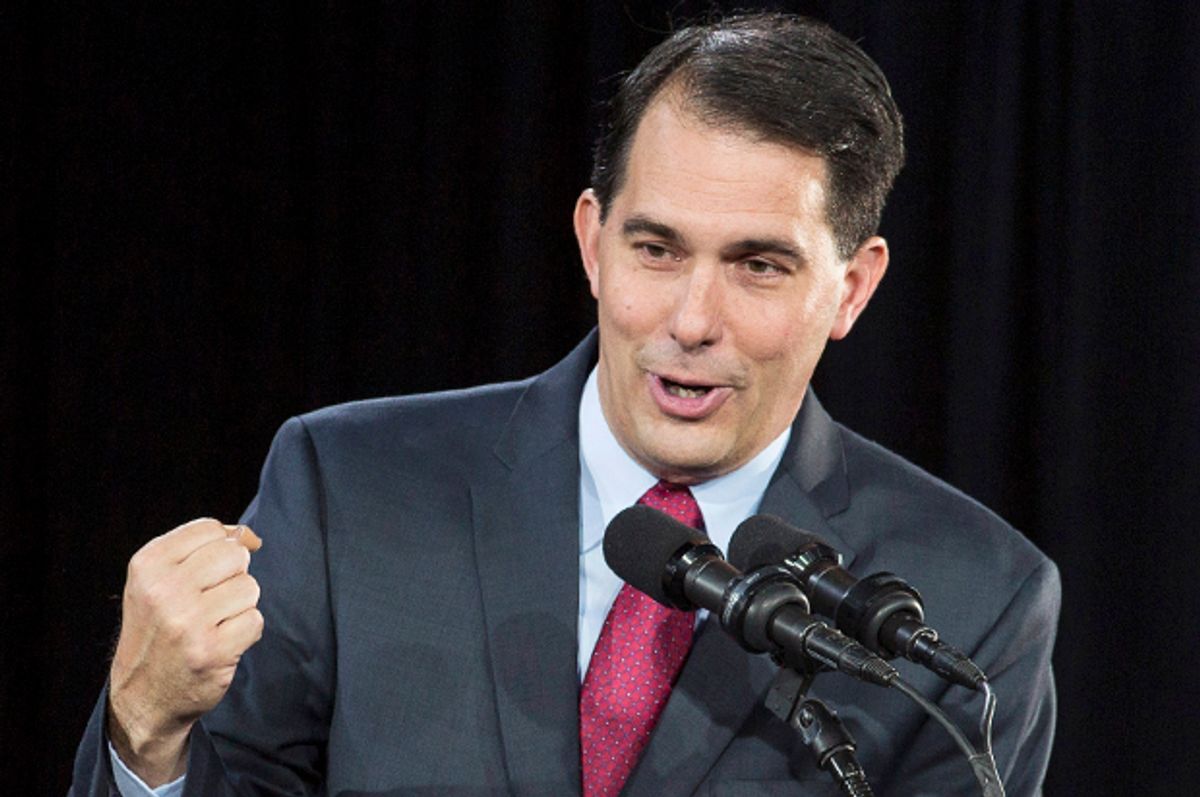Predictably, the Scott Walker 2016 bandwagon is already on the road, two days after the Wisconsin Republican governor beat challenger Mary Burke by a larger than expected margin. On election night the National Review asked: “Tonight’s big 2016 winner: Scott Walker?” Rush Limbaugh simply calls him “Scott Walker, Superstar.” That makes me think of Molly Shannon, but Limbaugh means it as a compliment.
The man himself is not doing anything to quiet such speculation. "I've never made a time commitment anywhere I've been in office,” he told reporters Tuesday night. “I've always made promises about what I would do and how I would do it. I'm not going to change now.”
Republicans make a big deal about Walker beating opponents three times in four years, as though surviving a recall is a badge of honor, not shame. (Limbaugh mistakenly says he survived “a couple of recalls.”) So be it: The GOP likes its politicians divisive, and Walker did indeed win three elections.
But like all the right-wing radicals elected governor in 2010, Walker is blessed by never having to survive a presidential election year. Turnout on Tuesday was 55 percent, even lower than the 57 percent in the recall, and far below the 70 percent turnout in the 2012 election, when President Obama carried the state.
In the end, Burke mostly ran a high-minded campaign to appeal to moderates and independents (her ads got saltier in the end), and while exit polls say she won moderates narrowly, Walker won independents 54-43. The Madison Democrat ran a fine campaign for a newcomer, but she ultimately didn’t galvanize her base the way Walker did his. In Milwaukee, the Democrats’ urban stronghold, turnout was 65 percent, down from an astonishing 87 percent in 2012, when Obama won the state. I can’t find numbers on black voter turnout, but while Burke won African-Americans 90-10 (Obama won 94-6), the total had to be lower than in 2012, given the big drop in Milwaukee, despite visits from the president and first lady.
None of this propels Walker to the front of the 2016 pack, even given that the pack is, if not weak, exactly, rather eccentric. I still don’t think New Jersey Gov. Chris Christie can make the race, given his own legal problems, but he is a dynamic campaigner (albeit a bully) who in 2013, at least, appealed beyond the GOP’s narrow base. Sen. Rand Paul is almost certain to jump in, and he’s enjoying a media honeymoon for combining time-honored far-right economic policies and uneven anti-interventionism with refreshing honesty about the GOP’s problems with non-white voters. Sen. Ted Cruz looks like he’ll be out there, too, running to the right of Paul and insisting Republicans don’t have to broaden their outreach to GOP doubters but simply crush them.
Walker’s appeal to national Republicans seems to be he’s a sleepy-eyed radical with a folksy non-charisma, so he won’t scare normal people the way Cruz does. But Walker is no moderate: RNC chairman Reince Priebus disclosed at CPAC this year that the then-Milwaukee county executive was among 15 Koch-allied radicals present at the creation of what became Wisconsin’s Tea Party movement way back in 2007, developing a template to bust unions and cut taxes. Grover Norquist boasted that Walker gave him the pen he used to sign his budget repair bill in 2011.
Beyond Walker’s political radicalism, there is so much for the national media to comb over in his puzzling biography. From his mysterious departure from Marquette University sans diploma, to his opaque “job” at the Milwaukee Red Cross (where he somehow found the time to run for state assembly twice in three years), to that treasure-trove of documents released in two John Doe probes into campaign law violations, to the six close associates convicted in one of those probes, Walker tops Chris Christie in unanswered ethical and biographical questions.
And where Christie has lived in the glare of the New York media market (which until this year tended to give him a pass), Walker is far from the national spotlight. Yes, his divisive policies and the recall election certainly got him more attention than, say, Minnesota Gov. Mark Dayton, but it’s nothing compared to what he’d face if he threw his hat into the 2016 ring.
And Walker is unlikely to hold up well in the heat of a national campaign. Rush Limbaugh got this wrong in his encomium to Walker, claiming “the Democrat Party has thrown everything they've got at Scott Walker, and he has beat them back without one syllable of complaint, without one ounce of whining.”
Maybe Rush wasn’t paying attention. In the closing weeks of the campaign, as he couldn’t quite shake off Burke, Walker went on a whining spree, first complaining about the media. “Only in Madison is someone who’s not the furthest left on the school board considered a moderate,” Walker told Robert Costa. “The bigger challenge to us is that the in-state media buys into that. When she says she’s socially liberal and fiscally conservative, they print it.”
Then he whined about not getting enough money from Chris Christie’s Republican Governors Association, with surrogates telling the Weekly Standard that “Christie might be tanking Walker, a potential rival for the 2016 Republican presidential nomination.” Walker himself claimed he was being neglected by the RGA, and ungraciously told reporters that Christie was coming to Wisconsin for one last campaign visit only “because he asked to.”
There’s one other caution for Walker in Tuesday night’s exit polls. Even in an election he won handily, 55 percent of Wisconsin voters said their governor would not make a good president. Walker ought to think twice before he takes his show on the road.

Shares